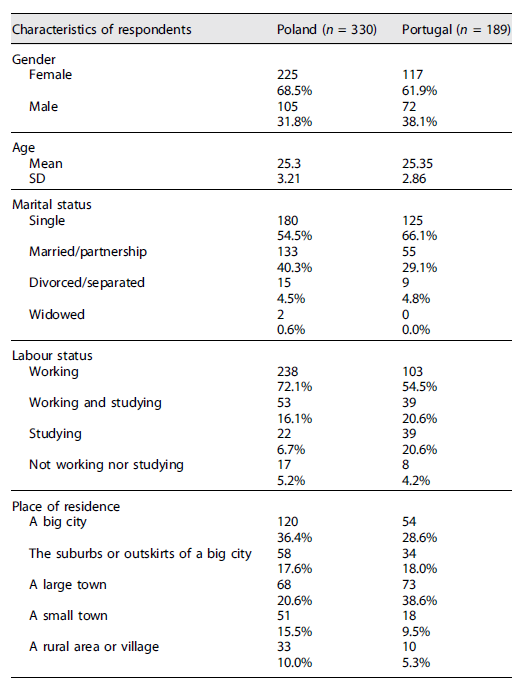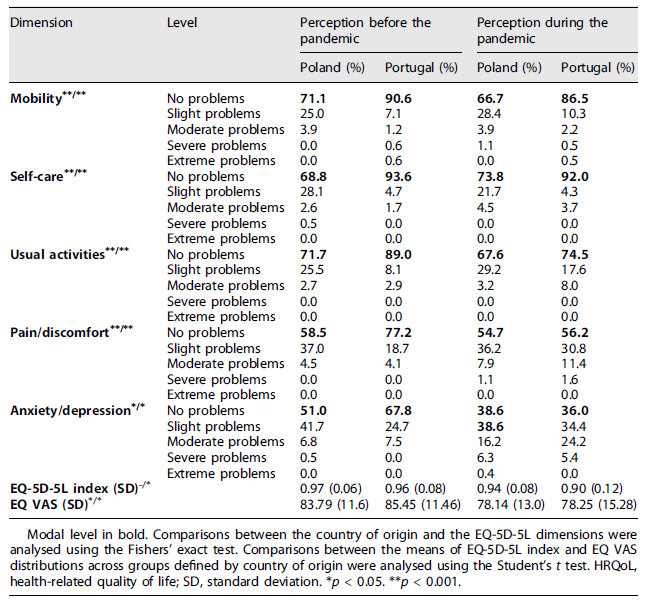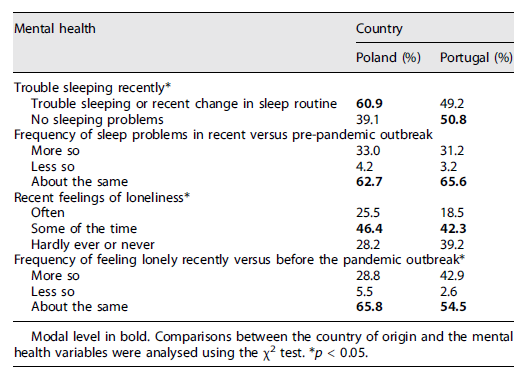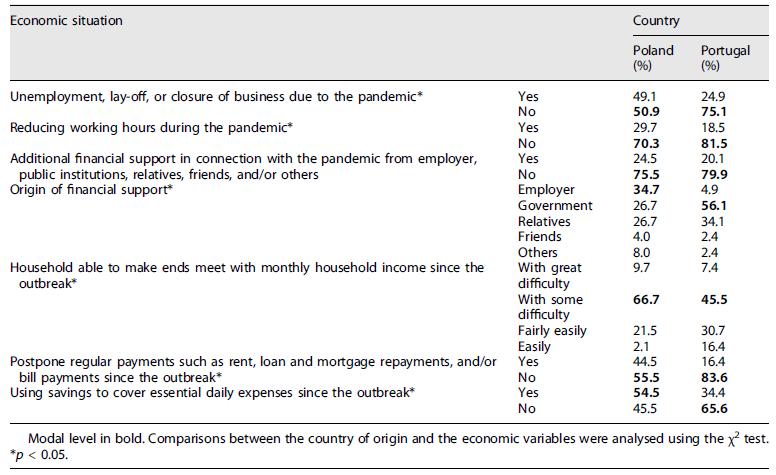Introduction
On March 11th, 2020, World Health Organization (WHO) declared COVID-19 disease a pandemic 1. With the increase in the number of cases and deaths, authorities all over the world have taken measures to stop the spread of the virus.
At the time of writing this article, the pandemic has been going on for more than 2 years during which waves of significant increases in incidence required the repeated imposition of safeguard measures by the governments of many countries. Taking this into account, concerns have been expressed by mental health experts and public health practitioners about the potential effects of COVID-19 2,3. The possible impact of social restrictions on well-being and mental health disorders has also been an area of concern 2,3. Research has been dedicated to addressing the prevalence of mental health problems; however, studies have raised social and economic issues as well 4,5. Although the pandemic has severely affected the elderly 6,7, it has been also challenging for young adults, who must deal with life-changing decisions despite the pandemic.
The set of common factors important for shaping the attitudes of young adults depends to a large extent on the requirements and developmental tasks characteristic for a given age of life. The youngest adults (18-24 years old) more often than those slightly older (25-35 years old) are studying, are not yet employed, are financially dependent on their parents, live extensive social lives, and make professional plans 8. Between the ages of 25 and 35, the “developmental tasks” become different: then they look for permanent life partners and start families, needing their own flat, financial independence, and professional stability. Thus, events of a different kind may form their outlook on life and their lifestyles 8.
Early pandemic research shows that COVID-19 stressors, such as economic issues affecting daily life, and academic delays were positively associated with the level of anxiety symptoms of Chinese college students during the pandemic, while social support was negatively correlated with their anxiety 3. A study in Asia has shown that mental health problems remain severe among most young people at a time of public health emergency and low education level; negative coping styles and post-traumatic stress syndrome symptoms were the influence factors of youth mental health 9. Other scholars have studied the influence of the economic situation on the psychological state during the pandemic 10. They concluded that economic insecurity is positively related to job insecurity and identity disruption and negatively related to psychological well-being. A global perspective on the issue can be found in the report of the Global Survey on Youth and COVID, which aims to capture the immediate effect of the pandemic on young adults regarding education, employment, mental well-being, rights, and social activism. The main findings suggest that the pandemic has been particularly hard for young women, teenagers, and youth in lower-income countries 11. In fact, young people living in lower-income countries experienced a reduction in working hours and in income. Young women were more likely to report a decrease in productivity. Moreover, young people living in lower income reported far more restricted access to online and distance learning. Young people reported reduced mental well-being and were even worse for young women 11.
Likewise, Polish researchers are concerned with the well-being of young adults during the pandemic. Szczepańska and Pietrzyka 12 found a strong correlation between the severity of the confinement measures during the pandemic and the level of student activity in public spaces, significant deterioration in their physical and mental well-being, and overall quality of life. Also, Dlugosz 13 has taken up the issue of the impact of pandemics on the lives of Cracow students. Most respondents believe that coronavirus is a danger, but only 1/3 said they feel threatened. They partially manifest symptoms of psychological stress in the form of tension, irritability, general apathy, and headaches. Equally, Portuguese researchers are trying to analyse the situation of young people and young adults during the time of COVID-19.
For example, Carneiro’s study 14 shows that Portuguese young adults perceived the situation of confinement to have significantly or completely affected the social and personal domains of their lives and increased alcohol consumption is associated with higher levels of stress. Participants of the study also reported an increase in time spent playing online games and several individuals initiated or re-initiated various risky behaviours. Other scholars have studied the impact of COVID-19 on mental well-being, quality of life, or social impact 15,16, but few were dedicated to Portuguese young people.
In fact, there is still a need for further research on the psychological, social, and economic situation related to COVID-19 and the mitigation of its negative effects. Although there are already some studies in Portugal and Poland on these matters 15,16, they are still a small number and some of them do not address all these aspects at the same time. In addition to the reduced number of published studies focusing on the psychological, social, and economic aspects of young people, to the authors’ knowledge, there are no studies that focus on young people from Portugal and Poland and compare them. In fact, given that Portugal is a Mediterranean country and Poland is a Central/Eastern European country, it would be interesting to understand whether young people from these two countries think in the same way regarding the psychological, social, and economic situation and health-related quality of life (HRQoL). Additionally, it would be interesting to understand whether the pandemic has had similar or different impacts on young people in these two countries since the measures taken by the Government authorities to fight the pandemic were different and the reactions of the populations across Europe to the imposed measures were very different.
Therefore, this research aims at studying the perceptions of changes during the COVID-19 pandemic in mental health, economic situation, and social relations among Polish and Portuguese young adults. The present study also sought to assess the perception of change during the pandemic in HRQoL among Polish and Portuguese young adults.
Materials and Methods
Study Design
The target population of this study was the young adult Polish and Portuguese population aged between 18 and 29 years old. The non-existence of a sampling frame with the population under study led the research team to decide to use a non-probabilistic sampling method. A combination of convenience and snowball sampling methods was applied to locate young adults from Poland and Portugal, within the age group targeted.
In December 2021, a pre-test of the questionnaire was applied to a sample of 10 young Polish and 10 young Portuguese adults, who were not included in the main survey. Comments and feedback about the questionnaire were collected and taken into account in the final version of the questionnaire.
Data collection was implemented using an online questionnaire. The participants were invited by email and through the researchers’ social networks to take part in the survey. Additionally, they were asked to share the link with other acquaintances that met the inclusion criteria, regarding age and nationality. The online survey was conducted from 26 January to 21 February 2022.
Questionnaire
The questionnaire included 36 questions, organized into five sections - HRQoL, mental health, social relations, economic situation, and background information about the respondents. The EQ-5D-5L questionnaire was used to measure the HRQoL of Poles and Portuguese. In addition, the study used questions from the SHARE-COVID-19 questionnaire to study the economic situation, social relations, and mental health of the respondents. Sections 2, 3, and 4 of the questionnaires were based on the SHARE-COVID-19 questionnaire, which is further explained below.
The last part of the questionnaire focused on sociodemographic aspects such as gender, age, marital status, labour status, and residence. The average time to complete the questionnaires was 10 min. The questionnaire was prepared in two languages - Polish and Portuguese. Each version had the same questions and structure. There was no need for translating or validating the questionnaire since all the questions included already existed in both languages and were also validated for both countries.
EQ-5D-5L
The EQ-5D-5L is one of the most widely used generic questionnaires in Europe developed by the EuroQoL group to provide a simple assessment of the quality of life 17. The EQ-5D-5L is a general questionnaire that comprises two parts: the EQ-5D-5L descriptive system and the EQ VAS.
The EQ-5D-5L descriptive system comprises five dimensions - mobility, self-care, usual activities, pain/discomfort, and anxiety/depression. Each dimension has five response levels: no problems, slight problems, moderate problems, severe problems, and unable to/extreme problems. It defines 3,125 possible health states and allows the computation of the EQ-5D-5L index, which reflects how good or bad a health state is according to the preferences of the general population of a country/region 18. The EQ VAS contains a visual analogue scale (by means of which the respondent assesses his/her current state of health on a scale from 0 [worst imaginable health state to 100 [best imaginable health state]).
In this study, we have used the Portuguese version of the EQ-5D-5L 19 and the Portuguese value set to obtain the EQ-5D-5L index 20. Similarly, the Polish version of the EQ-5D-5L and the Polish value set was used 21. As this study intended to study the perception of change in HRQoL during the pandemic among Polish and Portuguese, the sample was asked to fill in the EQ-5D-5L regarding the period before and during the pandemic, in order to capture the respondents’ perception of change.
SHARE COVID-19 Questionnaire
The Survey of Health, Ageing and Retirement (SHARE) COVID-19 Questionnaire was developed at the beginning of the pandemic. It includes 7 topics related to health and health behaviours, changes in professional and economic circumstances, as well as changes in social networks 22.
As mentioned above, sections 2, 3, and 4 of the questionnaire used for this research are based on selected questions from SHARE COVID-19 Questionnaire 1 23. The selected questions were four questions considering mental health (have you had trouble sleeping recently? Has that been more so, less so, or about the same as before the outbreak of Corona? How much of the time do you feel lonely? Has that been more so, less so, or about the same as before the outbreak of Corona?); two questions with multiple sub-questions considering social relations (during the last 3 months, how often did you do each of the following activities? Since the outbreak of Corona, how often did you have personal contact, that is, face to face, with the following people from outside your home?); seven questions asking about the economic situation of the participants (due to the Corona crisis, have you become unemployed, were laid off, or had to close your business? Did you reduce your working hours since the outbreak of Corona? Did you or any other household member receive additional financial support due to the outbreak of Corona from your employer, the government, relatives, friends, and/or others? Who gave you this financial support? Thinking of your household’s total monthly income since the outbreak of Corona, would you say that your household is able to make ends meet? Since the outbreak of Corona, did you need to postpone regular payments such as rent, mortgage 10 and loan payments, and/or utility bills? Since the outbreak of Corona, did you need to dip into your savings to cover the necessary day-to-day expenses?). These selected questions included dichotomic scales, as well as Likert scales. As the SHARE COVID-19 Questionnaire 1 was already available in Portuguese and in Polish, there is no need to translate or validate it to Portugal or Poland.
Statistical Analyses
Descriptive statistical analyses (i.e., mean, standard deviation, frequencies, and proportions [%]) were carried out to describe the sample, the respondents’ HRQoL mental health, social relations, and economic situation. To assess if there were differences between the EQ-5D-5L dimensions by country of origin, the Fishers’ exact test was used. In addition, differences between EQ-5D-5L index and EQ VAS distributions across groups defined by country of origin were assessed using the Student’s t test. Comparisons in mental health, social relations, and the economic situation between Polish and Portuguese samples were analysed using the χ2 test.
All the analyses were performed in IBM SPSS, version 28. Differences were considered statistically significant at a significance level of 0.05.
Ethical Approval and Informed Consent
The survey respondents were informed about the research aims, the anonymous nature of the data collected, and their freedom to refuse to participate, after which they gave their informed consent. The research project received approval from the Independent Ethical Committee of the University of the Algarve (refa CEUAlg Pn°61/2021) and complied with de Declaration of Helsinki.
Results
Study Sample
The research was conducted among young adults from Poland and Portugal. Table 1 presents the characteristics of the studied group according to sociodemographic features: gender, age, marital status, employment status, and place of residence. The study involved 519 respondents aged 18-29 years, including 330 from Poland and 189 from Portugal, with a mean age of 25.3 and 25.4, respectively. The Portuguese sample had fewer women (61.9%) than the Polish sample (68.5%). As was expected given the age of the participants in the survey, there was a majority of single persons in both samples. There was around 40% of Polish participants married or living in partnership, while there were less than 30% among the Portuguese participants. The majority of the respondents were employed in both samples: 72.1% Polish and 54.5% Portuguese. The Portuguese participants working and studying or only studying were around 20%; this proportion was particularly higher in the case of those only studying when compared with the Polish participants, there were only 6.7%. Among the respondents, most Poles lived in big cities or in their suburbs (53.9%), while this proportion was lower among the Portuguese participants (46.6%).
Health-Related Quality of Life
Respondents were asked to describe their perception of change in HRQoL during the pandemic based on the EQ-5D-5L descriptive system. The results are presented in Table 2.
The results show a higher proportion of respondents reporting no problems in mobility in both samples regarding the period before the outbreak of COVID-19 - as was expected since the surveyed sample was aged 18-29. However, the perception of the respondents during the pandemic shows an increase in mobility problems since the proportion of respondents in level 1 decreased in both samples. These results are similar in dimensions of usual activities and pain/discomfort - the number of respondents reporting perceived problems in these two dimensions is higher during the pandemic, compared to the perception of the period before the pandemic. In addition, there was an increase in the perception of problems regarding anxiety and depression during the pandemic, for both samples. Differences between EQ-5D-5L dimensions between Polish and Portuguese respondents were considered statistically significant.
Table 2 also reports the mean EQ-5D-5L index for the Polish and Portuguese samples. Both samples of respondents perceived a decrease in their HRQoL, when comparing the period before the pandemic with the period during the pandemic. Table 2 shows as well the perception of change in HRQoL assessed by the EQ VAS. Results show that, compared with their perception of HRQoL before the pandemic, both Polish and Portuguese respondents perceived a decrease in their overall HRQoL during the pandemic as measured by the EQ VAS. The results reveal that statistically significant differences appear in EQ-5D-5L index and in EQ VAS according to the country of origin, with exception of the perceived EQ-5D-5L index before de pandemic (Table 2).
Mental Health
The sample was asked to provide information on recent trouble sleeping, frequency of recent trouble sleeping before the pandemic outbreak, recent feelings of loneliness, and frequency of recent loneliness compared to before the pandemic outbreak (Table 3). The results showed that the majority of the Polish respondents (60.9%) had trouble sleeping or had recently changed their sleep mode, whilst almost half of the Portuguese reported these kinds of troubles. About one-third of the Polish respondents (33.0%) perceived that their sleeping problems increased during the pandemic, and these results are similar for the Portuguese respondents (31.2%).
Table 4 Perception of change in frequency of social activities and of personal contact (face to face)
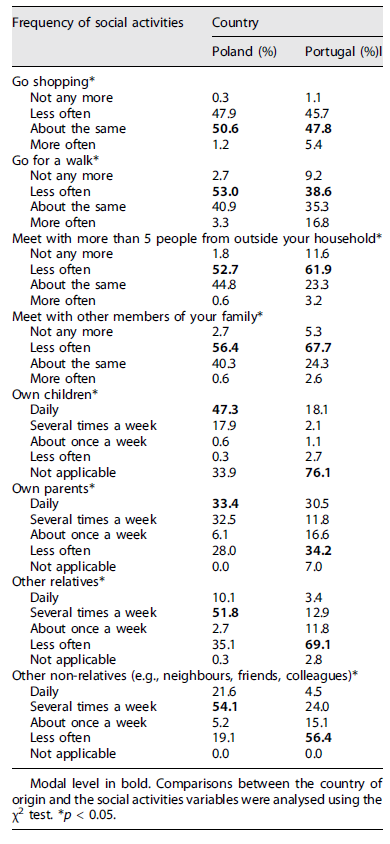
Similar proportions of respondents from the two countries reported recent feelings of loneliness some of the time (46.4% and 42.3%, respectively). These feelings are perceived more so than before the outbreak of COVID-19 by 28.8% of the Polish respondents and by 42.9% of the Portuguese respondents. The results show the existence of statistically significant differences in mental health variables according to the country of origin, with exception of the perceived frequency of recent sleeping problems when compared with the period before the pandemic.
Social Relations
Table 4 shows the perception of change in the frequency of activities and of personal contact (face-to-face) with others outside the home since the outbreak compared to before the outbreak. More than half (50.6%) of the Polish respondents perceive that they go out shopping as often during the pandemic as before the outbreak. However, also a significant proportion of respondents (47.9%) go out shopping at the time of the survey less often than before. The results reported by the Portuguese respondents are similar: 47.8% perceive the maintenance of the shopping frequency, while 45.7% perceive they go less often. Considering the frequency of going out for a walk, the majority of the Polish respondents (53.0%) perceive that they enjoy this pleasure less frequently than before the pandemic, while this proportion is much lower for the Portuguese respondents (38.6%). In fact, almost 17% of the Portuguese sample perceive that they go for a walk more often than before the pandemic. More than half of the respondents perceive that they met with more than five people from outside their household less often after the outbreak (52.7% Polish; 61.9% Portuguese) and visiting other family members (60.5%) less frequently compared to before the pandemic. Respondents from Poland met less frequently with other people than respondents from Portugal. This was also the case for meeting other family members: 56.4% of Polish respondents perceive a decrease in the meeting frequency, while this proportion is even higher in the Portuguese sample (67.7%).
Table 4 also shows that personal contact with their own children was perceived to be daily for 47.3% of the Polish respondents, while this was much lower for the Portuguese respondents (18.1%) since the majority (76.1%) did not have children of their own. Respondents from Poland (33.4%) were more likely to visit their parents daily than respondents from Portugal (30.5%). In addition, Portuguese respondents (12.9%) were less likely than Polish respondents (51.8%) to have had personal contact with other relatives several times a week. Regarding personal contact with other persons such as neighbours, friends, or colleagues, 54.1% of Polish respondents reported that they met them several times a week, while the majority of Portuguese respondents (56.4%) reported less frequent contact. The results show the existence of statistically significant differences in all social relations variables according to the country of origin.
Economic Situation
Table 5 presents the perceived results of the economic situation. The majority of the respondents from both countries did not become unemployed, were laid off, or had to close their businesses due to the pandemic. Nevertheless, 49.1% of Polish respondents found themselves in that situation, whilst only about one-fourth of the Portuguese respondents did. When asked whether the number of working hours of the respondents had decreased since the outbreak, almost three-quarters (70.3%) of the Polish respondents and 81.5% of the Portuguese respondents said that it had not decreased. Nevertheless, the proportion of respondents that perceived a reduction in working hours was high (29.7% within the Polish sample and 18.5% within the Portuguese sample). Additional financial support in connection with the pandemic from the employer, public institutions, relatives, or other persons was not received by the majority of the respondents from both samples. Such financial support was received by almost one-fourth of the Polish respondents and by one-fifth of the Portuguese respondents. Considering the total monthly household income since the outbreak, the majority of Polish respondents’ households had some difficulty making “ends meet” (66.7%); this proportion was 45.5 in the Portuguese sample. Almost 45% of the Polish respondents had to postpone regular payments such as rent, loan repayments, and mortgages due to the outbreak, but this proportion was lower within the Portuguese sample (83.6%). Respondents’ reports on the use of savings for daily expenses since the outbreak were somewhat different between both countries. While the majority of the Polish sample (54.5%) used their savings to cover essential daily expenses since the outbreak, this was not the case for 65.6% of the Portuguese sample. The results show the existence of statistically significant differences in all economic variables according to the country of origin.
Discussion
The present study sought to assess the perception of change during the COVID-19 pandemic in HRQoL among Polish and Portuguese young adults. It also aimed at studying the perceptions of changes during the COVID-19 pandemic in mental health, economic situation, and social relations among Polish and Portuguese young adults.
The findings reveal that almost 2 years since the beginning of the pandemic Polish and Portuguese young adults reported a perceived lower level of HRQoL in comparison to the times before the outbreak of COVID-19. The results show that the perception of the respondents shows an increase in problems related to mobility, usual activities, pain/discomfort, and anxiety/depression during the pandemic The EQ-5D-5L index shows that both samples perceived a decrease in their HRQoL, when comparing the period before with the period during the pandemic.
When assessing the perception of changes in mental health, results showed that the pandemic has affected the sleeping habits of both samples. The proportion of Poles who feel lonelier is higher than the proportion within the Portuguese sample, but the increase in the frequency of feelings of loneliness recently when compared to before the pandemic was higher within the Portuguese sample. Respondents from both countries reported a perception of a decrease in the frequency of meeting other people, whether relatives or non-relatives.
Similar results were obtained at the very beginning of the pandemic where 53.8% of respondents rated the psychological impact of the pandemic on mood as moderate or severe and 16.5% of respondents reported moderate to severe depressive symptoms 24. The result of the study also showed that vulnerable groups, i.e., those showing higher levels of stress, anxiety, and depression, were women, people with specific physical symptoms (e.g., muscle pain, dizziness), and students. Another recent study published by Portuguese researchers revealed that quarantined people reported higher levels of anxiety and lower HRQoL, as measured by the EQ-5D-5L, compared with the pre-COVID-19 pandemic general population and that those with higher levels of anxiety tended to have a lower HRQoL 19.
Although the majority of the surveyed respondents did not become unemployed, were laid-off, or had to close their businesses due to the pandemic, a high proportion of respondents perceived a reduction in working hours, received additional financial support in connection with the pandemic, had some difficulty to make the household income to fulfil their needs, had to postpone regular payments, and use their savings to cover essential daily expenses since the outbreak. In short, the results showed a perceived economic deterioration in both samples. The findings are in line with Szustak et al. 25 that found the economic situation of Poles people ambiguous. However, most Poles are doing well financially and do not complain about the state of their household budget during COVID-19, but the pandemic depleted some of it. The reason why savings are melting away may therefore be the reluctance of Poles to take on debt in times of economic instability and thus more inclined to compromise their savings than to use credit or loans to finance larger purchases. It cannot be excluded that in this way respondents were thus trying to compensate for lower incomes during the lockout or even for losing them altogether. Based on literature research published at the time of writing this manuscript, this study appears to be the first to examine HRQoL to the same extent as the psychological, economic, and social consequences of a pandemic among young respondents from two different European countries.
However, this study had certain limitations that need to be taken into consideration. First, the respondents were based on non-probabilistic convenience and snowball techniques, which do not ensure the representativeness of the target population. Therefore, these results cannot be generalized to the entire Polish young adult population, nor to the entire Portuguese young adult population. Second, as noted in the introduction young adults are a group that is diverse in terms of developmental tasks. The questionnaire, on the other hand, focused more on young adults who are independent and self-supporting. Thus, the questionnaire could have included more differentiating questions for those still in university and living with their parents. This issue is also linked to another limitation, namely, other variables that could have been included in the questionnaire, such as level of education or the need to study/work remotely or on-site. Such variables might play a relevant role in the aim of the study. Nevertheless, there was a need to balance the length, the method of data collection, and the purpose of the questionnaire. Another limitation is the time when the survey was carried out - about 2 years after the announcement of the pandemic. It would also be extremely interesting to have carried out this study during the first lockdown. Given the variation in COVID-19 restrictions, the same research undertaken during the first lockdown could have impacted the results. Finally, as this is a cross-sectional study with one-time data collection, the study assessed the perception of change and not the change itself.
Despite its limitations, this study offers insights into the importance of studying these different areas. In fact, a comprehensive survey covering various areas of life is important in terms of improving the lives of the population since an effective pandemic response should consider the fact that social, economic, and health problems are closely interlinked.
Taking into account the perceived differences in mental, economic, and social relations between respondents from Poland and Portugal, it would be interesting to investigate whether these differences are correlated with the different restrictions for both countries - such as the length and number of lockdowns, the ban on moving between municipalities, or social isolation measures. A study along these lines could indicate which restrictions are more effective in combating the virus while imposing the least possible burden on society.
Conclusion
The COVID-19 pandemic was an unexpected and sudden social experience. The collective lockdown recommended by the WHO to slow down the spread of the pandemic has caused health, social, and economic consequences. The uncertainty and the constant fear of getting sick have affected most aspects of citizens’ lives. Particular attention should be paid to those in risk groups, including young adults. With the recurring restrictions and growing uncertainty, Portuguese and Polish young adults are facing an increased risk of depression and anxiety.
The results of this study indicate what factors contribute to the worsening of the respondents’ general living situation. It also shows that governments and health authorities should, in addition to the medical consequences, take the necessary measures to mitigate the long-term consequences of the virus, as well as pay special attention to young adults who are trying to make the most important decisions for their development.
Acknowledgments
Lara N. Ferreira acknowledges support from CEISUC/CIBB and from CinTurs that are both funded by national funds through FCT - Foundation for Science and Technology, I.P., under the Multiannual Financing of R&D Units 2020-2023 (CinTurs: UIDB/04020/2020; CEISUC/CIBB: UIDB/04539/2020).
Statement of Ethics
All procedures performed in studies involving human participants were in accordance with the ethical standards of the institutional and/or national research committee and with the 1964 Helsinki Declaration and its later amendments or comparable ethical standards. This study was reviewed and approved by the research Ethics Committee of the University of the Algarve (ref CEUAlg Pn°61/2021). Informed consent was obtained from all individual participants included in the study. Participants were informed about their freedom for refusal.













